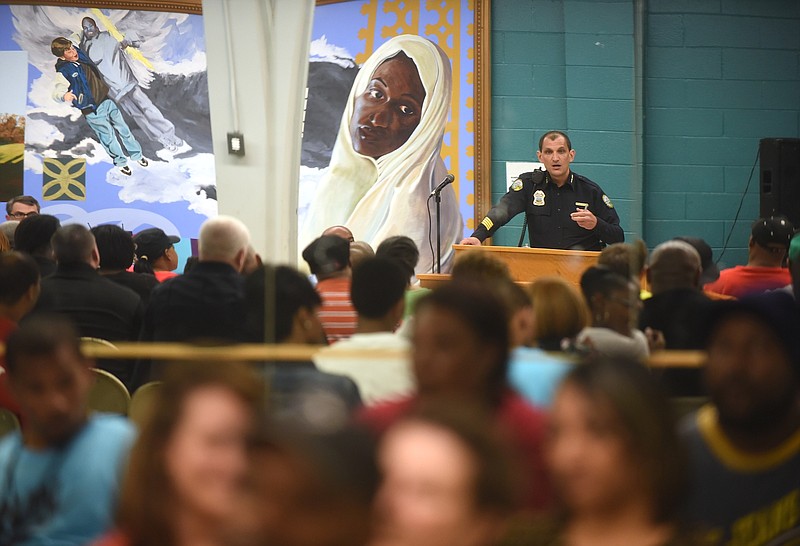If you go
Healing on Both Sides meets again April 23 at noon at the Avondale Center. Parents are invited to bring their children for a discussion on how to save their families.
Angela Logan sat with her legs crossed and her hands together, rocking for an hour hoping to learn more about why no one had been arrested for killing her son more than a year ago.
"I have just settled myself that it [an arrest] won't happen," she said. "It hurts, but I'll keep it moving."
Logan was one of several parents of slain sons and daughters in the support group Healing On Both Sides who attended a meeting Tuesday at the Carver Recreation Center. They wanted to hear details from law enforcement officers about where Chattanooga police are in terms of solving their cases and why it has taken so long.
But instead of asking specific questions, the family members listened as group founder James Moreland asked a panel of law enforcement officials about the process police follow when doing an investigation, why bonds sometimes are set so low and why there aren't stricter penalties for juveniles.
Panelists answering questions included police Chief Fred Fletcher, District Attorney Neal Pinkston, Juvenile Court Judge Robert Philyaw and city Public Safety Coordinator Paul Smith, who is transitioning from that job starting April 1.
Fletcher told the audience law enforcement personnel attended because they care about the community, and that there is nothing more important to them than taking care of people including victims, survivors and offenders.
The chief then called on Lt. Glenn Scruggs, who said police investigate every lead on a case and it takes time to do that. Fletcher said some people get frustrated because they call and name a person they believe was involved with a crime and that person is not arrested. He said an anonymous phone call about a person is called intelligence. It can lead police in the right direction, but an anonymous call naming a person is not enough evidence to make an arrest, he said.
Fletcher also discussed efforts to improve community relations and hire more minority police officers.
Pinkston said the laws governing the punishments for crimes are set by the state Legislature, and if people think they're too lenient they should lobby lawmakers for tougher penalties. Philyaw then said that the whole point of juvenile court is to rehabilitate youth, not to punish them. It's only when the judge decides that youths can't be rehabilitated before age 19 that he sends them to be tried in court as adults.
Moreland called the group together to allow parents to get answers, and he charged the crowd with showing love and respect when talking to panelists and each other. He asked parents with specific questions to pull law enforcement representatives aside after the meeting.
"We invited these people so that they can answer questions so that we can become one," Moreland said. "We have lost too many young people, and it is on our watch."
But after an hour and a half of listening to general responses to general questions some people began to leave in frustration.
The audience included Logan's sister, Kurria Rogers, the mother of 24-year-old George Dillard Jr., who was fatally shot with his 25-year-old girlfriend Lakita Hicks in January. The couple's double slaying drew national attention because their five-year-old son was with them when they were shot and the boy made the 911 call. The crowd also included Sherra Tellis, who came with her five young grandchildren. They are the children of her 28-year-old son, Edward Glen, who was fatally shot in 2013.
Logan said that, with so many unsolved cases, she can't help but think there is a lack of concern for crime in inner-city communities.
"When the military officers got killed, they shut down the neighborhood," she said, referring to the July 16 attacks. "They went above and beyond, but you're not doing that to find all these other killers. They're just telling us that they're working the cases and they can't do nothing without us."
Contact staff writer Yolanda Putman at yputman@timesfreepress.com or 423-757-6431.
